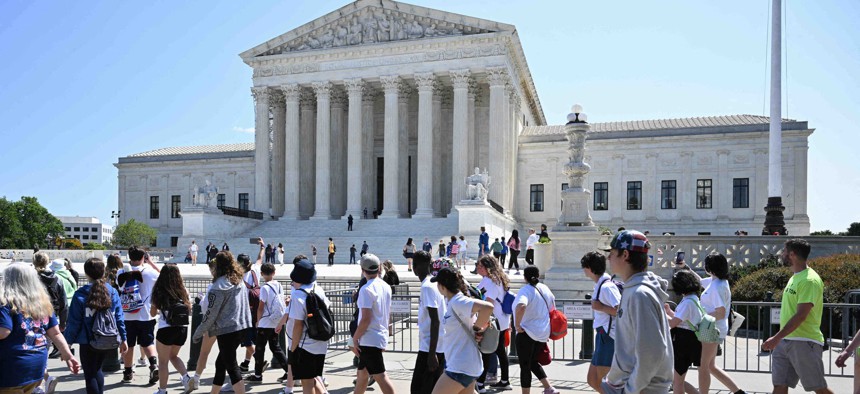Supreme Court Scales Back Scope of Clean Water Act

Mandel Ngan / AFP via Getty Images
Conservatives on the court say the decision preserves state authority to regulate land and water use. But liberal justices worry the ruling will gut efforts to curb water pollution.
The Supreme Court on Thursday significantly scaled back the types of places that are subject to the Clean Water Act, in a setback for environmentalists and the Biden administration.
The high court ruled unanimously in favor of an Idaho couple that tried to build a home on a lot near Priest Lake. The justices determined that the property that Michael and Chantell Sackett want to build on was not closely connected enough to the lake or the nearby wetlands.
But the judges agreed on little else beyond that. They split into four groups to explain their rationales, and to try to provide guidance for landowners and government regulators about how to determine whether other properties were subject to federal pollution controls.
Those rules have been up in the air since the last time the Supreme Court tried to come up with a hard-and-fast rule for wetlands in 2006. That has confounded state and local officials, but even they have often been on opposing sides of the fight.
A majority of five judges agreed Thursday that the Clean Water Act only applies to wetlands that have a continuous surface connection to bigger bodies of water, where it is hard to tell where the “waters” end and the “wetlands” begin.
That’s a stricter interpretation than the one that the Biden administration has been using, which specifies that the wetlands had to have a “significant nexus” with a body of water. The Environmental Protection Agency under Biden took that standard from a 2006 Supreme Court ruling, in which there was no clear majority.
On Thursday, though, Justice Samuel Alito argued that the narrower definition passed down by the court this week preserves state authority to regulate land and water use.
“An overly broad interpretation of the [Clean Water Act’s] reach would impinge on this authority,” Alito wrote for the majority.
“The area covered by wetlands alone is vast—greater than the combined surface area of California and Texas. And the scope of the EPA’s conception of ‘the waters of the United States’ [that are governed by the Clean Air Act] is truly staggering when this vast territory is supplemented by all the additional area, some of which is generally dry, over which the agency asserts jurisdiction,” he wrote.
If Congress wants to impinge on state authority on land and water use, Alito added, it needs to make a “clear statement” to that effect.
Alito also worried about what would happen to landowners who wanted to build on their property but couldn’t discern on their own whether wetlands there had a “significant nexus” to rivers or lakes. The EPA’s test uses “a variety of open-ended factors that evolve as scientific understandings change,” he noted.
“This freewheeling inquiry provides little notice to landowners of their obligations under the [Clean Water Act],” Alito wrote. “Facing severe criminal sanctions for even negligent violations, property owners are left to feel their way on a case-by-case basis. Where a penal statute could sweep so broadly as to render criminal a host of what might otherwise be considered ordinary activities, we have been wary about going beyond what Congress certainly intended the statute to cover.”
The decision provides some clarity to wetland regulation, but the judges clearly remain divided on the best approach. The unanimous decision masks the fact that there is a 5-4 divide on a major question of the scope of the law, as well as deeper ideological disputes.
Two justices in the majority—Clarence Thomas and Neil Gorsuch—agreed with Alito’s opinion but indicated they think federal authority over waterways is even narrower. They contend that the Constitution only meant to give Congress the power to regulate navigable interstate waterways and only gave them that power to ensure that the waterways remained navigable.
Justice Brett Kavanaugh split from the rest of the Republican-appointed judges on the court to argue that the majority’s definition of wetlands covered by the law was too narrow.
Kavanaugh stressed that the Clean Water Act itself said it covered wetlands “adjacent” to bigger bodies of water. But that’s not what the standard the Alito-led majority used, Kavanaugh complained. Instead, the majority limited the law’s effect to wetlands “adjoining” bodies of water.
He said the term “adjacent” is broader than “adjoining.” A house can be “adjacent” to another house even if it’s separated by a driveway or shrubs, Kavanaugh explained, while “adjoining” means they’d actually have to touch.
“The court’s rewriting of ‘adjacent’ to mean ‘adjoining’ will matter a great deal in the real world,” Kavanaugh warned. It could prevent regulation of wetlands behind levees along the Mississippi River or separated at the surface from the Chesapeake Bay, he said.
Kavanaugh said the court’s new rule would change the way federal agencies have interpreted the law for nearly half a century.
“The eight administrations since 1977 have maintained dramatically different views of how to regulate the environment, including under the Clean Water Act,” he wrote. “Yet all of those eight different administrations have recognized as a matter of law that the Clean Water Act’s coverage of adjacent wetlands means more than adjoining wetlands and also includes wetlands separated from covered waters by man-made dikes or barriers, natural river berms, beach dunes, or the like.”
The court’s three liberal justices—Sonia Sotomayor, Elena Kagan and Ketanji Brown Jackson—signed on to Kavanaugh’s concurrence.
The three Democratic appointees also filed their own concurrence, written by Kagan, that blasted the majority for repeatedly narrowing the scope of federal environmental laws.
Kagan chided the majority for its focus on protecting the rights of property owners, even though Congress passed the Clean Water Act specifically to prevent landowners from polluting.
“Surely something has to be done; and who else to do it but this court?” Kagan wrote, mocking the majority. “It must rescue property owners from Congress’s too-ambitious program of pollution control. So the majority shelves the usual rules of interpretation—reading the text, determining what the words used there mean, and applying that ordinary understanding even if it conflicts with judges’ policy preferences.”
Kagan took exception to the majority’s finding that Congress had to issue a “clear rule” when passing broad policy, something that a conservative majority of the court also did last year when it overturned EPA limits on greenhouse gas pollution. The majority in both cases limited the scope of EPA regulations because they said the laws were vague. But Kagan said the laws were intentionally broad, not vague.
“A court may not rewrite Congress’s plain instructions because they go further than preferred,” she wrote. The majority’s “non-textualism” in those cases makes it easier to pollute both air and water, she said. “The vice in both instances is the same: the court’s appointment of itself as the national decision-maker on environmental policy.”
Daniel C. Vock is a senior reporter for Route Fifty based in Washington, D.C.
NEXT STORY: State turns to the cloud to manage transportation projects






